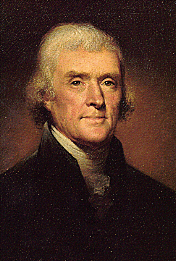
To John Page Annapolis, May 25, 1766DEAR PAGE, -- I received your last by T. Nelson whom I luckily met on my road hither. surely never did small hero experience greater misadventures than I did on the first two or three days of my travelling. twice did my horse run away with me and greatly endanger the breaking my neck on the first day. on the second I drove two hours through as copious a rain as ever I have seen, without meeting with a single house to which I could repair for shelter. on the third in going through Pamunkey, being unacquainted with the ford, I passed through water so deep as to run over the cushion as I sat on it, and to add to the danger, at that instant one wheel mounted a rock which I am confident was as high as the axle, and rendered it necessary for me to exercise all my skill in the doctrine of gravity, in order to prevent the center of gravity from being left unsupported the consequence of which would according to Bob. Carter's opinion have been the corruition of myself, chair and all into the water. whether that would have been the case or not, let the learned determine: it was not convenient for me to try the experiment at that time, and I therefore threw my whole weight on the mounted wheel and escaped the danger. I confess that on this occasion I was seised with a violent hydrophobia. I had the pleasure of passing two or three days on my way hither at the two Will. Fitzhugh's and Col'o. Harrison's where were S. Potter, P. Stith, and Ben Harrison, since which time I have seen no face known to me before, except Cap't. Mitchell's who is here. -- but I will now give you some account of what I have seen in this metropolis. the assembly happens to be sitting at this time. their upper and lower house, as they call them, sit in different houses. I went into the lower, sitting in an old courthouse, which, judging from it's form and appearance, was built in the year one. I was surprised on approaching it to hear as great a noise and hubbub as you will usually observe at a publick meeting of the planters in Virginia. the first object which struck me after my entrance was the figure of a little old man dressed but indifferently, with a yellow queue wig on, and mounted in the judge's chair. this the gentleman who walked with me informed me was the speaker, a man of a very fair character, but who by the bye, has very little the air of a speaker. at one end of the justices' bench stood a man whom in another place I should from his dress and phis have taken for Goodall the lawyer in Williamsburgh, reading a bill then before the house with a schoolboy tone and an abrupt pause at every half dozen words. this I found to be the clerk of the assembly. the mob (for such was their appearance) sat covered on the justices' and lawyers' benches, and were divided into little clubs amusing themselves in the common chit chat way. I was surprised to see them address the speaker without rising from their seats, and three, four, and five at a time without being checked. when a motion was made, the speaker instead of putting the question in the usual form, only asked the gentlemen whether they chose that such or such a thing should be done, and was answered by a yes sir, or no sir: and tho' the voices appeared frequently to be divided, they never would go to the trouble of dividing the house, but the clerk entered the resolutions, I supposed, as he thought proper. in short everything seems to be carried without the house in general's knowing what was proposed. the situation of this place is extremely beautiful, and very commodious for trade having a most secure port capable of receiving the largest vessels, those of 400 hh'ds being able to brush against the sides of the dock. the houses are in general better than those in Williamsburgh, but the gardens more indifferent. the two towns seem much of a size. they have no publick buildings worth mentioning except a governor's house, the hull of which after being nearly finished, they have suffered to go to ruin. I would give you an account of the rejoicings here on the repeal of the stamp act, but this you will probably see in print before my letter can reach you. I shall proceed tomorrow to Philadelphia where I shall make the stay necessary for inoculation, thence going on to New-York I shall return by water to Williamsburgh, about the middle of July, till which time you have the prayers of
Dear Page P. S. I should be glad if you could in some indirect manner, without discovering that it was my desire, let J. Randolph know when I propose to be in the city of Williamsburgh. |
